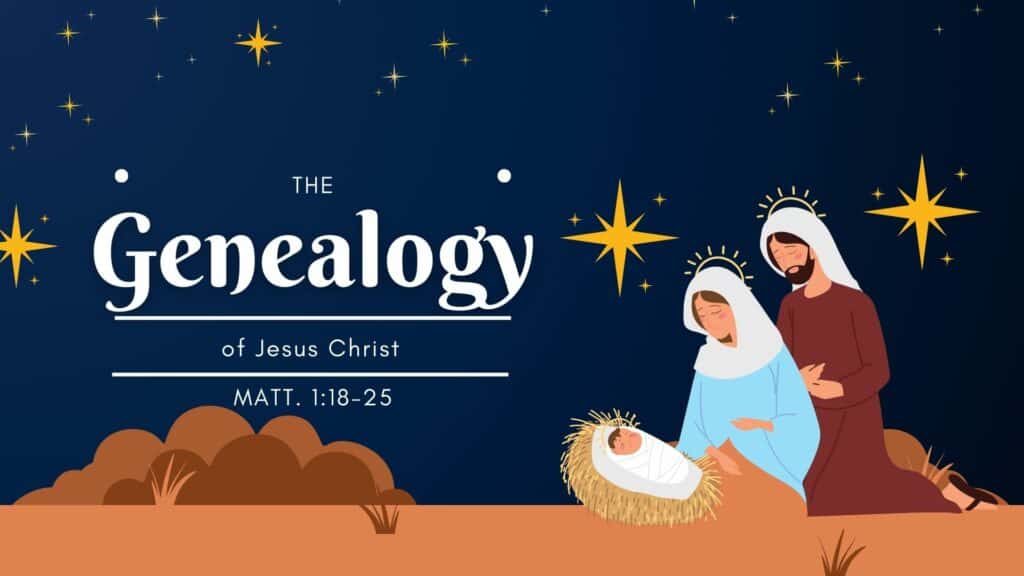It is interesting how Matthew lays out the genealogical narrative from Abraham to Joseph based on 1:1-16. That structure, however, breaks off at Matt. 1:16. In 1:16, Matthew writes, “and Jacob the father of Joseph the husband of Mary, of whom Jesus was born, who is called Christ.”
Reading from an English translation can give us the idea that Jesus was born from Mary and Joseph. However, look at the emphasis. The writer emphasizes Mary by using the feminine term ἐξ ἧς (ex hēs). If we translate this phrase, it would be “from whom.” Therefore, based on the usage of this phrase “ἐξ ἧς” (ex hēs), Matthew is saying that Jesus is the offspring of Mary. But then this raises a problem in the genealogy!
How did Jesus come from Joseph’s lineage when he was born of Mary? (The conundrum!) Amazingly, the Word of God doesn’t confuse us! Matthew doesn’t keep us in perplexity in this narrative for too long. He reveals this in 1:18-25 that Joseph adopts Jesus into his family, thus adopting Him into his family line.
In verses 18-25, Matthew carefully places (by the help of the Holy Spirit God) the name of Jesus in 18 and the name of Jesus (Ἰησοῦν) in verse 25. This is, from a grammatical standpoint, an inclusio or a bookend. In 1:21, Joseph was told that he would “name” the child Jesus. In 1:25, we learn that the text ends with the name of “Jesus” (Ἰησοῦν).
Did you catch what Joseph did? He “named” Jesus as Jesus. It indicates Joseph’s adoption of Jesus into his family line. Problem solved.
Though it seems like the problem is solved, Matthew doesn’t stop there. A little further, he provides a name for Jesus, derived from Jewish Scriptures, which is “Immanuel” (God with us). So, the perplexity about Jesus’ genealogy we learned is good. Matthew shows not only that Jesus was from the royal line but also that He was the Royal Messiah-King. Matthew shows his audience that not only Jesus was of the Davidic line, where He alone is worthy to establish God’s kingdom, but also that he is the Savior. In 1:21, we learn that Jesus came to save His people from their sins. This is tied up with Matthew 28:19 so nicely.
Just as Matthew bookends the name of Jesus in 1:21-25, so he bookends Matthew’s gospel with God “with us.” The Greek phrase μεθ’ ὑμῶν (meth’ humōn) points out that God would be with us, that is, Immanuel would be with us; He is from the beginning to the end and in between.
What is the point of it? Matthew’s interest is not only to show that Jesus belongs to the promised genealogical line. But he is much more than that – He is Immanuel, who came to save his people.
Though Mary conceived Jesus by the power of the Holy Spirit, he still belongs to Joseph’s line, but by the way of adopting Jesus to the Davidic lineage. Now, we should not stop at that. Jesus did not come from the Davidic lineage because of Joseph’s adoption but because God declared that He would come from the line of the tribe of Judah as a Lion of the Tribe of Judah.

Praise the Lord, sir. I did not go through Greek scripture, but as per my study and understanding, Jesus is the prophetic messiah. Both Mary (the physical line of Jesus) and Joseph (the legal line) came from David’s lineage. The Gospel of Matthew was given Joseph’s lineage, and Luke was given Mary’s lineage.
Good observations!